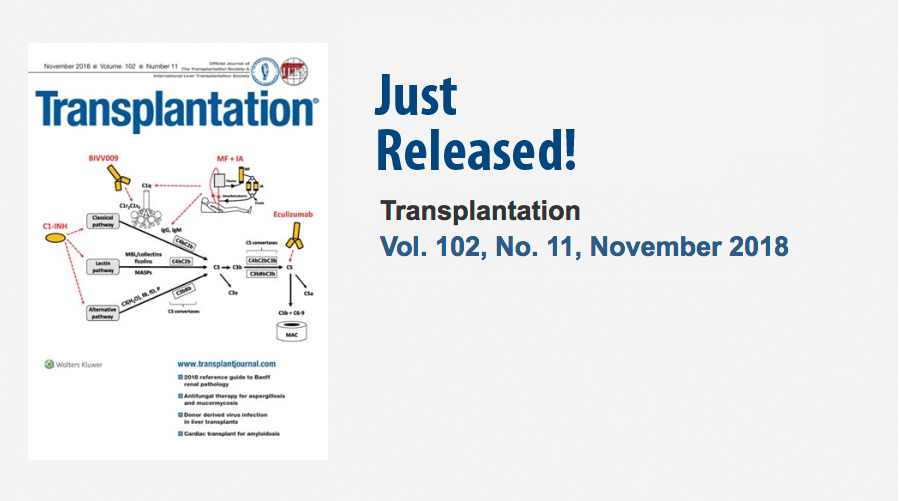
This issue is packed with outstanding papers, reviews, and commentaries. The highlight is the 2018 complete guide to Banff renal allograft pathology. For the first time you don't have to read multiple papers to work out the current Banff scoring system—laid out with excellent illustrations. Antifungal agents are advancing as fast as one can read the papers so here is a review to help. A guide to donor derived viruses in liver transplantation answers many questions. The issue also has much to offer for VCA, cardiac, and renal transplantation. A must read issue.
Webinar Announcement - Liver Series on
"TRENDS AND CHALLENGES IN LIVER TRANSPLANTATION"
TRIAGE FOR SIMULTANEOUS LIVER KIDNEY TRANSPLANTATION AND CLINICAL PEARLS TO OPTIMIZE RENAL PROTECTION AFTER LIVER TRANSPLANTATION
NOVEMBER 6, 2018 - 2 PM EST (MONTREAL TIME)
Click here for full details and to sign up
 |
Organizer: Sukru Emre, MD Professor of Surgery (Transplant) and of Pediatrics, Yale University New Haven, CT, USA |
 |
Moderator: Marcelo Cantarovich, MD Professor, Department of Medicine, Division of Nephrology, Faculty of Medicine, McGill University Montréal, QC, Canada |
 |
Discussant: Annmarie Huysman Liapakis, MD Assistant Professor of Medicine (Digestive Diseases), Yale School of Medicine New Haven, CT, USA |
 |
Discussant: Clifford D. Miles, MD, MS, FAST Associate Professor of Internal Medicine University of Nebraska Medical Center Omaha, NE, USA |
TTS-ILTS PAIRED TRANSPLANT CENTERS PROGRAM
Deadline January 1, 2019
The deadline to submit an application is JANUARY 1, 2019
The TTS-ILTS Paired Transplant Centers Program is a collaboration between The Transplantation Society (TTS) and the International Liver Transplantation Society (ILTS) supporting new liver transplant programs in emerging countries.
TTS-ILTS program advertisement and question request: Please submit any questions you have about the program or the application process to This email address is being protected from spambots. You need JavaScript enabled to view it..
Education Committee Question for physicians
The Education Committee - WTGF working group wants to know what resources are currently at physicians disposal to assist patients stay physically active post transplant? Are there any current standard practices within your institution? Please let us know by emailing This email address is being protected from spambots. You need JavaScript enabled to view it..
TRANSPLANTATION JOURNAL - HIGHLIGHTED ARTICLE
A 2018 Reference Guide to the Banff Classification of Renal Allograft Pathology
Roufosse, Candice; Simmonds, Naomi; Clahsen-van Groningen, Marian; Haas, Mark; Henriksen, Kammi J.; Horsfield, Catherine; Loupy, Alexandre; Mengel, Michael; Perkowska-Ptasińska, Agnieszka; Rabant, Marion; Racusen, Lorraine C.,; Solez, Kim; Becker, Jan U.
Transplantation: November 2018 - Volume 102 - Issue 11 - p 1795–1814
doi: 10.1097/TP.0000000000002366
The Banff Classification of Allograft Pathology is an international consensus classification for the reporting of biopsies from solid organ transplants. Since its initial conception in 1991 for renal transplants, it has undergone review every 2 years, with attendant updated publications. The rapid expansion of knowledge in the field has led to numerous revisions of the classification. The resultant dispersal of relevant content makes it difficult for novices and experienced pathologists to faithfully apply the classification in routine diagnostic work and in clinical trials. This review shall provide a complete and simple illustrated reference guide of the Banff Classification of Kidney Allograft Pathology based on all publications including the 2017 update. It is intended as a concise desktop reference for pathologists and clinicians, providing definitions, Banff Lesion Scores and Banff Diagnostic Categories. An online website reference guide hosted by the Banff Foundation for Allograft Pathology (www.banfffoundation.org) is being developed, which will be updated with future refinement of the Banff Classification from 2019 onward.
In the News
Liver Transplantation for the GI Specialist: A 'Matter of Communication'
October 30 - Liver transplantation remains the last curable option for many chronic and severe acute liver diseases. For gastroenterologists who wish to play a more active role in liver transplant cases, the key to good pre- and posttransplant patient care is to communicate with the local transplant center and develop a proper team dynamic. Working together, the GI specialist and transplant center can minimize unnecessary transfers and improve follow-up.
Does the US discard too many transplantable kidneys?
October 27 - Comparing transplant data between countries may help address the global organ shortage, according to a study that will be presented at ASN Kidney Week 2018 October 23-October 28 at the San Diego Convention Center. The study provides evidence that some kidneys discarded in the United States are a lost opportunity that could have benefitted some patients.
UK - One in 10 people may opt-out of proposed organ donor system
October 29 - A new study has revealed that around one in 10 people are considering opting out of a proposed new system that aims to increase organ donation by presuming consent. The research, from the University of Stirling, found that those planning to opt-out of the new approach - earmarked for Scotland and England - reported stronger emotional barriers towards organ donation. These include discomfort at thinking about one's own death and feelings of disgust about organ donation.
Frailty may lower kidney failure patients' likelihood of receiving a transplant
October 27, 2018 - Frailty is associated with lower likelihoods of being placed on the kidney transplant waitlist and of receiving a transplant, according to a study that will be presented at ASN Kidney Week 2018 October 23-October 28 at the San Diego Convention Center.
Time to Question Obesity-Based Cutoffs in Kidney Transplantation? Study finds outcomes non-inferior to patients with BMI 35 and under
October 29 - It's common for kidney transplant centers to reject potential recipients because they are highly obese, but critics in recent years have called these standards too strict. Now, a new study of transplant outcomes suggests that these restrictions are "arbitrary and unfounded," because these patients can actually fare well compared with their non-obese counterparts.
Germany proposes law to increase organ transplants
November 1 - Just under 800 people donated their organs in 2016. Health Minister Jens Spahn wants to improve those numbers by revamping hospitals and introducing a system where you opt out of donating organs, rather than opting in.
Heart - 'Increased-Risk' Transplant Safer Than Waiting
October 30 - Dennis Blough had been on the waiting list for more than 2 years when the call came. His surgeon at the University of Southern California in Los Angeles had a heart ready for transplant. But the good news came with a caveat: The heart was from an ''increased-risk'' donor.
Thousands die waiting for liver transplants. This tactic could yield more organs.
October 31 - Each year in the United States, more than 2,500 people die while waiting to receive liver transplants or become too sick to undergo the surgery and must be removed from the wait list. As with hearts, kidneys, and lungs, there simply are not enough livers to go around. To increase the supply, researchers are pursuing a variety of strategies to rejuvenate "marginal" organs — those discarded because they are decayed, diseased in some way, or simply too old.
Upcoming Meetings
IPTA 2018 Symposium
The International Pediatric Transplant Association is proud to feature a special section activity: the 2018 Symposium in Organ Transplantation in Children: An educational forum for physicians, surgeons, and allied health professionals.
The focus of this symposium is aimed at clinical and research fellows in pediatric solid organ transplantation, as well as residents, and other allied health professional or non-physician trainees who are planning a career in pediatric transplantation.
IPTA 2019 - Call for Abstracts Now Open
Contact
+1-514-874-1717
This email address is being protected from spambots. You need JavaScript enabled to view it.
Address
The Transplantation Society
International Headquarters
505 Boulevard René-Lévesque Ouest
Suite 1401
Montréal, QC, H2Z 1Y7
Canada








